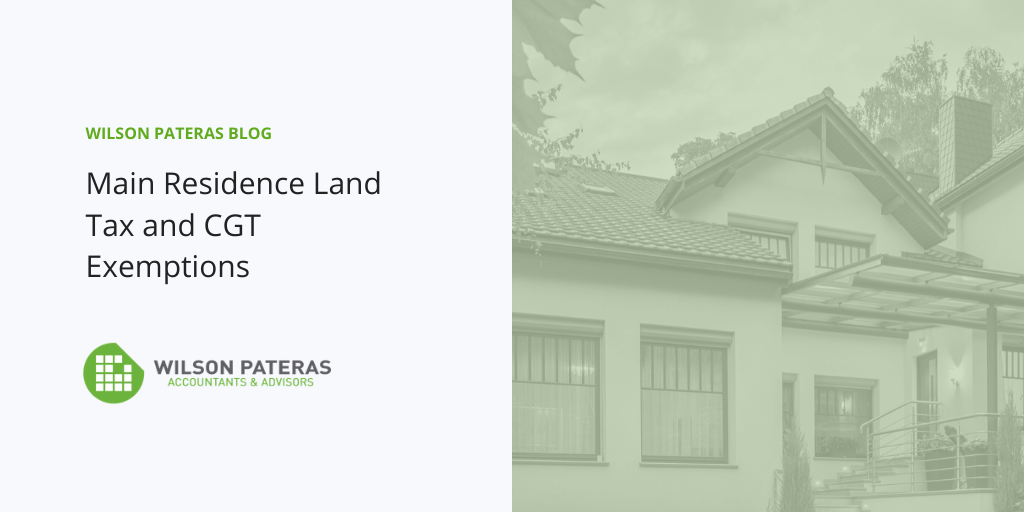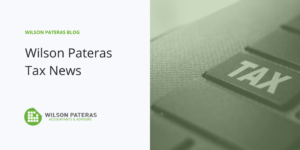
Owning your own home has always been considered the great Australian dream. Both the State and Federal governments recognise that with exemptions on land and capital gains tax (CGT), respectively. These exemptions apply to your main residence (also called your principal place of residence).
Land tax exemption
The land on which your residential home is situated is exempt from land tax in Victoria. This exemption is available for land that is:
- owned by you as an individual (or as a trustee) and you reside on it.
- inherited by you if it becomes your new residential home.
If you do not qualify for land tax exemption, you are required to pay annual land tax on all Victorian land that you own (or jointly own) that exceeds a current market value of $250,000. Current land tax rates in Victoria are as follows:
| Land value | Land tax payable |
| Less than $250,000 | Nil |
| Between $250,000 and $600,000 | $275 plus 0.2% of the amount above $250,000 |
| Between $600,000 and $1 million | $975 plus 0.5% of the amount above $600,000 |
| Between $1 million and $1.8 million | $2,975 plus 0.8% of the amount above $1 million |
| Between $1.8 million and $3 million | $9,375 plus 1.3% of the amount above $1.8 million |
| Over $3 million | $24,975 plus 2.25% of the amount above $3 million |
The Valuer-General in Victoria is responsible for conducting land valuations every two years.
Eligibility requirements
You must live on the land for at least six months in a financial year to claim the exemption. You therefore cannot claim more than one residential land tax exemption per financial year.
How to apply
Simply fill out a Notice of Acquisition of an Interest in Land (NOA) form and submit it to Land Use Victoria. Once this acquisition is registered, you will be exempt from tax on that land.
Main residence CGT exemption
In addition to the land tax exemption, your main (principal) residence is also exempt from CGT in Australia. Vacant land however is not exempt from CGT, nor is an investment property that you rent out to tenants.
As the name suggests, capital gains tax is a tax on the profit you make from the sale of a non-exempt asset. CGT is paid at your marginal rate of tax (if you need to pay it), on the gain less a discount of 50%, if you have held the asset you sell for longer than 12 months.
Eligibility requirements
A dwelling is considered to be your main residence for CGT exemption purposes if:
- you and your family live there.
- your personal belongings are there.
- your mail is delivered to its address.
- it’s your registered address on the electoral roll.
- utility services like power and gas are connected to it.
To qualify for the main residence exemption, you must also:
- be an Australian resident for tax purposes.
- not have received the property as the beneficiary or trustee of a deceased estate.
Main residence exemption FAQs
Can you have more than one main residence?
Yes, but restrictions apply. You cannot have more than one main residence for longer than six months. You may have more than one residence for a period of time when you buy a new dwelling to move into and you are waiting to sell your existing one.
If it takes you longer than six months to sell your old residential property, you can still treat it as your principal place of residence for CGT purposes even after you have moved into your new property. However, this will likely impact on your ability to claim the full CGT exemption on your new property in the future. Instead, you will only be able to claim a CGT exemption on it from the date your previous property was sold.
What if my main residence eventually becomes an investment property?
The main residence CGT exemption can apply for six years after you move and rent your property out, however the principle that you can only have one principal place of residence still applies. In other words, you will not be able to claim another property as well during that time period as your main residence CGT-exemption purposes.
What happens if I’m absent from the property but don’t rent it out?
If you vacate your main residence for a period of time but don’t rent it out or claim another property as your principal place of residence, the main residence CGT exemption applies indefinitely.
What happens if I use my main residence to generate other non-tenant income?
If you use your residential home (or part of it) to generate business income, you will not be entitled to the full main residence CGT exemption if you sell the property. Instead, you will only be entitled to a partial exemption. It is best to seek professional advice in these circumstances.
What if an investment property eventually becomes my principal place of residence?
Again, the principle that you can generally have only one principal place of residence applies. You would only be available for a CGT exemption from the date that the investment property became your principal place of residence, not while it was tenanted.
What happens if I buy land to build on as my main residence?
You can treat the land as your main residence from the date you buy it, provided that:
- you do not nominate another property as your main residence for more than six months afterwards, and
- you subsequently build on the land and move into your new residence within four years.
What if I live in a different home to my spouse and children?
Again, you can only have one principal place of residence for main residence CGT-exemption purposes. You will have to decide which one it is before you sell.
How we can help
Our experienced team of tax advisors at Wilson Pateras in Richmond can help you to minimise your tax. Our individual services also include financial planning, retirement planning, and advice on setting up and/or managing your own self-managed super fund (SMSF).




